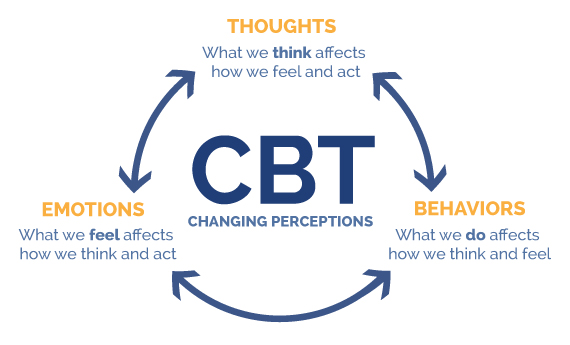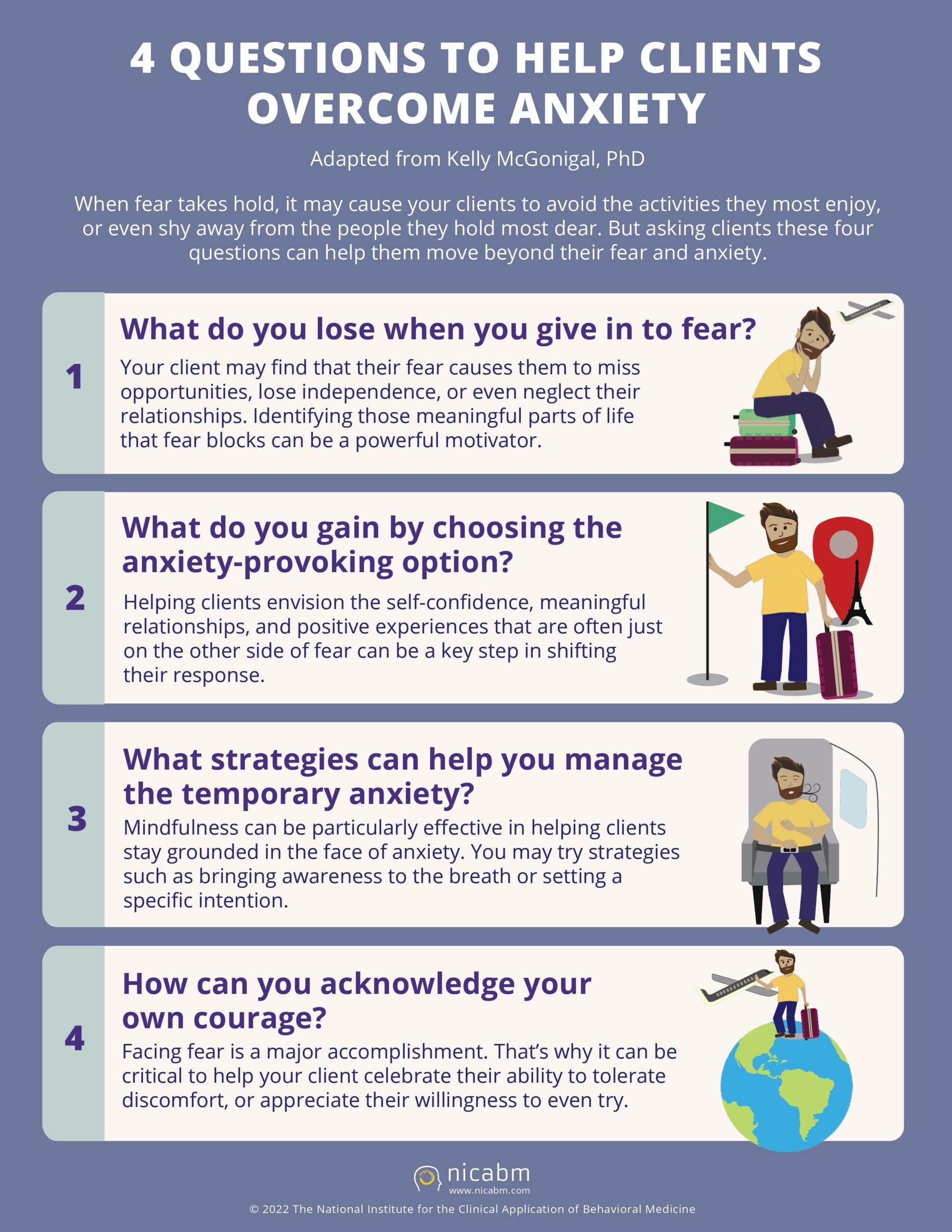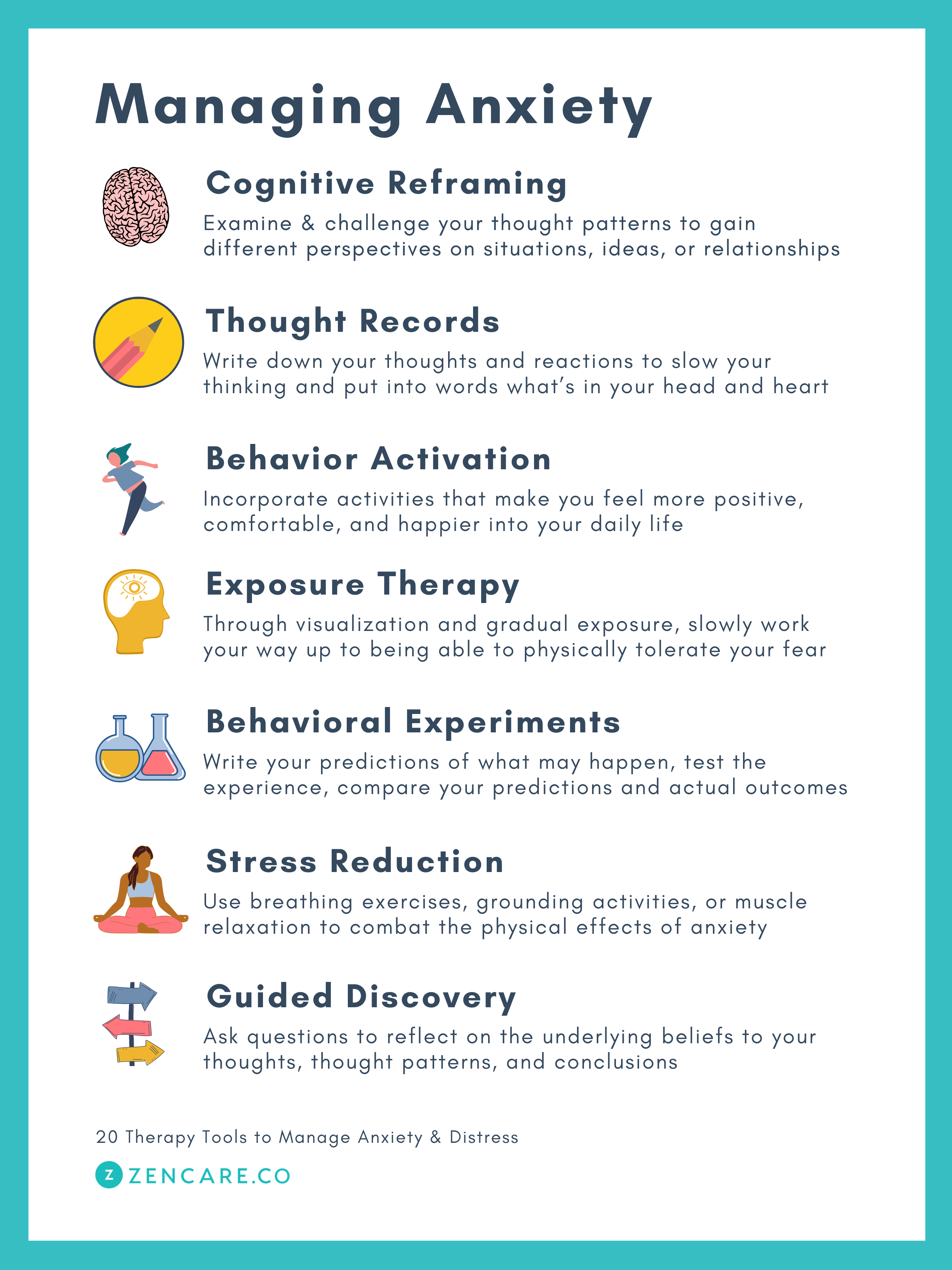One-on-one counselling for anxiety sessions that change lives
One-on-one counselling for anxiety sessions that change lives
Blog Article
Exploring Different Techniques in Coaching for Anxiousness Problem for Enduring Adjustment
When taking on anxiousness problems, it's necessary to discover a selection of therapy strategies. Each technique uses special understandings and devices to aid you manage your symptoms effectively. You might locate that combining techniques can yield the most effective outcomes. Comprehending the subtleties of these approaches is vital to cultivating long-term modification. What if the best combination could launch a brand-new degree of psychological wellness for you?
Understanding Anxiety Disorders: A Brief Overview
Anxiety problems, which affect numerous individuals worldwide, can substantially affect day-to-day live. You might experience frustrating feelings of fear or worry that appear unmanageable. These sensations can bring about physical signs and symptoms like an auto racing heart, sweating, or also lightheadedness. Typical kinds of anxiousness conditions include generalised stress and anxiety disorder, panic problem, and social stress and anxiety condition. Each has special indications, yet they all share a propensity to disrupt your routine and relationships.Understanding the source of your anxiety is vital. It could come from genes, brain chemistry, or life experiences. Identifying your triggers can assist you handle your reactions much better. It is necessary to bear in mind that you're not the only one in this struggle. Many individuals deal with comparable challenges, and looking for help is a solid step toward sensation much better. By finding out regarding anxiety disorders, you're already on the course to understanding and handling your problem much more efficiently.
Cognitive-Behavioral Treatment: Testing Negative Idea Patterns
In Cognitive-Behavioral Therapy, you'll start by determining the negative thought activates that contribute to your anxiousness. Once you acknowledge these thoughts, you'll service replacing them with even more positive options. Together, you'll develop reliable coping techniques to aid handle your anxiety in daily situations.
Determining Unfavorable Idea Triggers

Identifying the details triggers behind your adverse ideas can be crucial in taking care of anxiousness when you run into moments of distress. Beginning by taking notice of scenarios that prompt sensations of fear or anxiety. Is it a jampacked space, an approaching due date, or a conversation with certain individuals? Write these instances in a journal. This will certainly aid you recognize patterns in your reasoning. Additionally, notification physical feelings that accompany your negative ideas, like an auto racing heart or tightness in your chest. By identifying these triggers, you acquire insight right into what's fueling your stress and anxiety. Comprehending these connections is the primary step in challenging those thoughts and ultimately regaining control over your psychological actions.
Changing Thoughts With Positives
Testing adverse idea patterns is a necessary step in changing your state of mind and minimizing anxiousness. You may usually find yourself entraped in cycles of self-doubt or disastrous reasoning. Rather of letting these ideas determine your feelings, method replacing them with favorable affirmations or reasonable choices. For circumstances, when you think, "I can't handle this," move it to, "I can manage obstacles one action at a time." This straightforward change can substantially influence your mood. Regularly determining and countering these negative ideas helps produce a much healthier inner discussion. Keep in mind, it requires time and initiative, but constantly practicing this method can result in lasting modification, encouraging you to encounter anxiousness with restored self-confidence and resilience.
Building Coping Strategies Together
Changing unfavorable thoughts is only the beginning of managing stress and anxiety efficiently. To produce enduring modification, you need to build coping techniques that empower you. Cognitive-Behavioral Therapy (CBT) aids you determine and test those unhelpful thought patterns. With each other, you and your therapist can explore just how these ideas effect your feelings and behaviors.Start by developing useful methods, like journaling or mindfulness exercises, that permit you to face anxiousness head-on. When you encounter your worries gradually, you'll find out to react differently.

Mindfulness and Acceptance-Based Approaches: Growing Present-Moment Understanding
As you browse the complexities of anxiousness, incorporating mindfulness and acceptance-based methods can significantly enhance your capability to grow present-moment understanding. By concentrating on the present moment, you'll find that you can observe your ideas and sensations without judgment (Counseling services for anxiety). This method aids you acknowledge your stress and anxiety without feeling overwhelmed by it.Engaging in mindfulness workouts, such as deep breathing, body scans, or directed reflections, allows you to ground yourself in your existing experience. Acceptance-based methods urge you to embrace your emotions instead than deal with versus them. They lose their power over you.Incorporating these techniques into your daily routine can transform exactly how you react to stress and anxiety when you approve your feelings. You'll establish resilience and discover to navigate difficult scenarios with better ease. Ultimately, cultivating present-moment understanding lays the foundation for enduring adjustment, equipping you to lead an extra meeting life
Direct Exposure Treatment: Challenging Fears Gradually
Exposure therapy helps you confront your worries in a steady means, making it much less frustrating. You'll discover strategies to encounter anxiety-provoking situations step by action, while also building coping techniques to manage your reactions. This strategy empowers you to take control and reduce anxiety with time.
Steady Direct Exposure Strategies

When dealing with anxiety, gradually challenging your concerns can be a powerful means to gain back control. This technique, called progressive exposure, includes gradually revealing yourself to the scenarios or items that trigger your anxiety. Begin with less intimidating situations and gradually function your way approximately more go difficult ones. If you're afraid of public speaking, you might start by talking in front of a mirror, then advance to sharing ideas with a close friend, and ultimately resolve a small team. Each action helps desensitize you to the fear, developing your self-confidence over time. Keep in mind, it's important to rate yourself and celebrate little triumphes as you move via this process, strengthening your capability to take care of anxiety effectively.
Building Coping Approaches
Structure effective coping techniques is essential for handling anxiousness, especially as you confront your concerns slowly - Counseling services for anxiety. One powerful method is exposure therapy, where you start by facing your anxieties in a regulated fashion. Start with much less frightening situations and slowly work your way up to even more challenging scenarios. This gradual exposure helps desensitize you to stress and anxiety sets off, making them less overwhelming.Incorporate leisure methods, such as deep breathing or mindfulness, to soothe your mind throughout direct exposure. Track your development, celebrating tiny triumphes along the means to improve your find more self-confidence. Remember, it's alright to take your time; the goal isn't perfection but steady improvement. By building these strategies, you'll empower on your own to browse anxiousness and welcome life a lot more completely
Psychodynamic Therapy: Uncovering Source of Anxiousness
Psychodynamic therapy explores the subconscious mind, revealing the root creates of your anxiousness. By analyzing your ideas, sensations, and past experiences, this method helps you discover underlying disputes and unresolved issues that may add to your present anxiety. You'll collaborate with a therapist to examine youth experiences, partnerships, and psychological patterns that form your actions today.As you acquire insight right into these deeper layers of your mind, you'll start to acknowledge how previous events affect your present behavior. This understanding can bring about catharsis, enabling you to refine emotions you could have suppressed.Through the restorative relationship, you can additionally determine defense systems that might have created gradually, offering a clearer path to alter. Eventually, psychodynamic therapy furnishes you with the devices to address your anxiousness at its core, promoting enduring improvement in your psychological well-being.
Integrative and All Natural Techniques: Integrating Techniques for Greater Efficacy
Integrating numerous healing strategies can improve your trip towards handling anxiousness better. By combining aspects from cognitive-behavioral therapy, mindfulness techniques, and all natural methods, you can produce a tailored approach that addresses your special demands. You could make use of cognitive-behavioral strategies to test negative idea patterns while incorporating mindfulness exercises to ground on your own in the existing moment.Additionally, exploring holistic techniques such as yoga or meditation can promote leisure and lower stress and anxiety symptoms. This mix permits you to develop better self-awareness and resilience.Experimenting with these varied approaches can help you find what resonates most with you. Keep in mind, it has to do with locating a synergy that functions, as opposed to sticking to a single approach. This integrative technique not just provides instant relief but also fosters long-term abilities for taking care of anxiousness, equipping you to recover control over your life.
The Function of Support Equipments: Building Resilience Through Connection
While it could seem that managing anxiousness is a solitary journey, having a strong support group can play an important duty in your durability. Bordering yourself with empathetic friends, family members, or support groups creates a secure space where you can honestly share your feelings and experiences. When you attach with others, you remind on your own that you're not the only one in this struggle.These relationships use inspiration and can supply useful coping approaches that have functioned for others. It's also a possibility to get perspective; close friends can assist you see scenarios differently, decreasing sensations of isolation.Moreover, psychological support promotes a feeling of belonging, which can considerably reduce stress and anxiety signs. By leaning on your support system, you can develop strength and tackle difficulties extra efficiently. Remember, connecting for assistance signifies strength, and it can make all the difference in your trip toward handling anxiousness.
Regularly Asked Questions
What Are the Usual Signs And Symptoms of Anxiousness Disorders?
You might experience restlessness, tiredness, difficulty concentrating, impatience, muscle mass tension, and rest disturbances. Physical signs can include quick heartbeat, sweating, and trembling. Acknowledging these indications early can aid you look for ideal assistance and therapy.
How Much Time Does Therapy Normally Last for Anxiousness Disorders?
Therapy for anxiousness problems usually lasts anywhere from a couple of weeks to a number of months. It actually depends upon your private requirements, progression, and the strategies your therapist utilizes to help you handle your anxiousness efficiently.
Can Medication Be Made Use Of Along With Treatment for Stress and anxiety?
Yes, medicine can definitely be used alongside treatment for stress and anxiety. Incorporating both techniques often boosts therapy efficiency, aiding you take care of signs while exploring underlying problems with therapy (Counseling services for anxiety). Constantly consult your doctor for customized suggestions
Are There Self-Help Techniques for Taking Care Of Anxiousness?
Yes, there are several self-help strategies for taking care of stress and anxiety. You can practice mindfulness, take part in normal workout, maintain a well balanced diet plan, develop a routine, and make use of deep breathing methods to help in reducing anxiety signs properly.
Exactly how Do I Know if I Need Expert Help for Stress And Anxiety?

Report this page